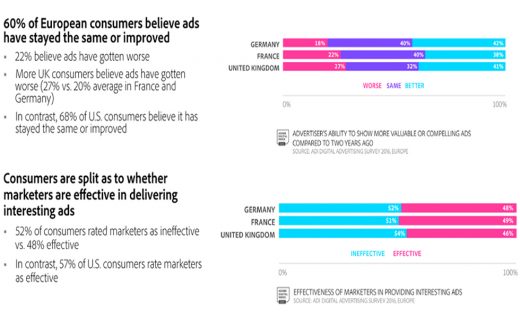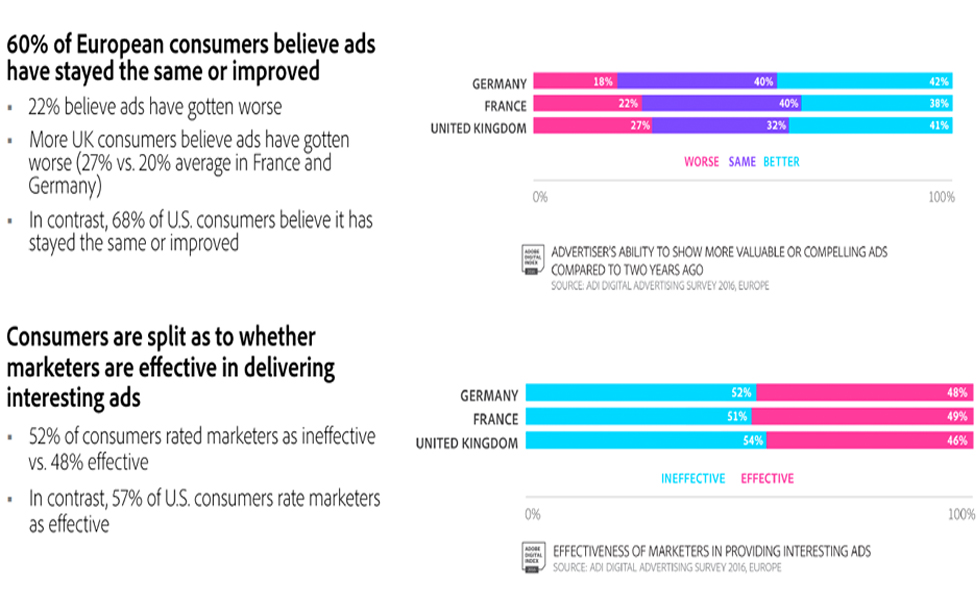U.K. Consumers Seem To Think Advertising Is Getting Worse
Is digital advertising ‘getting worse’? UK consumers seem to think so
UK consumers are the most likely to think online advertising is ‘getting worse’ or becoming more ‘creepy or intrusive’ when compared to their European and US counterparts.

Marketers have a big job in convincing Brits to turn off their ad blockers, with a new study finding UK consumers are among the most critical when it comes to online advertising.
According to the study by Adobe, 27% of UK consumers believe digital ads have ‘got worse’ over the past three years. This is ahead of France on 22%, the US on 20% and Germany on 18%.
Meanwhile, more than half (54%) of people in the UK would describe online advertising as ‘ineffective’, compared to 52% in Germany, 51% in France and 43% in the US.
Adobe’s product marketing manager Julia Soffa suggests the UK’s disdain for online advertising could be down to “cultural reasons” and a higher volume of ads being targeted to them. The higher rate of smartphone ownership and relative maturity of the online market in the UK also means consumers here are often more aware of the pitfalls of online advertising.
“The volume of advertising and opportunities to be targeted by a brand are higher in the UK than the US. People in the UK see more ads and there are more touchpoints so they are more likely to be critical,” says Soffa. “Generally Europeans are more sensitive than Americans to being bombarded by advertising.”
Marketers must be less intrusive
The results suggest marketers need to pay much more attention to the type and volume of ads they are showing UK consumers. For video ads, half (50%) said they would stop watching an ad entirely if it was not skippable, again ahead of other markets, while 74% said they ‘try to skip ads as soon as possible’.
And when it comes to display advertising, the UK consumer was found to be ‘most unwilling’ (at 63%) to watch ads that pop-up after a link is clicked, ahead of France on 59% and Germany on 46%. Ads that are ‘annoying’ was the main reason (at 51%) UK consumers gave for using ad blocking software, ahead of the volume of ads and concerns around malware and security.
 Soffa believes that the data shows the UK online ad market, and in particular mobile, is in the “growing pain stage” with marketers still testing what works and what does not in terms of effectiveness and consumer attitudes. And she suggests marketers should see this data as a reason to “get creative” with advertising rather than relying too much on data.
Soffa believes that the data shows the UK online ad market, and in particular mobile, is in the “growing pain stage” with marketers still testing what works and what does not in terms of effectiveness and consumer attitudes. And she suggests marketers should see this data as a reason to “get creative” with advertising rather than relying too much on data.
“Consumers want dynamic creative. A relevant piece of content that with the right data can deliver something personal to a particular audience. Advertising can get boring if it is just driven by data; there is a reason that creative is emotional and nostalgic and resonates with people.
“As marketers there is an opportunity to really expand the creative canvas with the data, not drill down and spread messages that are not relevant just because we have access to email addresses or inventory,” she explains.
The fastest growers
The research also found that among entertainment, retail, travel, finance, automotive and health websites, website traffic is broadly flat; in reality this means about half are growing, while the rest are shrinking in size. And of that traffic, on mobile, 68% comes through advertising channels such as referrals, social media, SEO or display.
Websites that were optimised for mobile early – as well as those that make use of personalised messages via email and social media- are currently growing at the fastest rate, according to Adobe.
Soffa concludes: “There are three key areas to a successful online marketing strategy; cross channel, personalisation and not forgetting who your audience is.
“The goal of advertising has not changed, it is still about audiences. But now marketers have to drive cross channel and address the challenges such as ad blockers. They show us we still have a job to do to make advertising less disruptive and annoying.”
Marketing Week, Thursday, September 15, 2016
(26)



